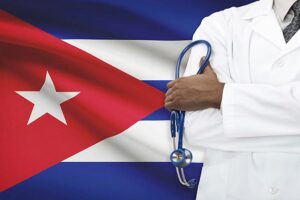The Cuban Centre for Genetic Engineering and Biotechnology (CIGB) and the Russian National Centre for Medical Research in Endocrinology signed an agreement here on Tuesday to expand scientific-medical ties.
The signing ceremony took place at the centenary Moscow Institute of Endocrinology, where the institution’s director Natalia Mokrysheva described the event as an important step in strengthening Russian-Cuban ties in joint work in the field of endocrinology.
«We are confident that our cooperation will open new horizons for the implementation of innovative treatment methods and scientific research, which, in turn, will benefit our patients and the entire medical community,» she said, also a member of the Eurasian giant’s Academy of Science.
We remain confident that the integration agreement with the IGBC will open up new opportunities to broaden and deepen scientific cooperation, facilitate the exchange of experience and clinical training, friendly and business relations in the field of medicine and health care,» Mokrysheva remarked.
For his part, the deputy director general of the IGBC, Jorge Valdés, told Prensa Latina that he was pleased that the two centres have today consolidated their long-standing friendship with the signing of this agreement. «I hope that our cooperation will be very fruitful, both scientifically and practically,» he said.
He added that the project will expand the development of molecular genetic research for the treatment of hereditary, genetic and endocrine diseases, while combining the capabilities of the two institutions to further advance molecular genetic research for the benefit of Russian and Cuban patients.
«The step we have reached today is the result of joint work carried out over the last 10 years, through the exchange of different therapies of Cuban origin, such as the treatment to combat diabetic foot ulcers with the use of the drug Eberprot-P,» explained Valdés.
From 2017 to 2019, the Diabetic Foot Department of the Russian National Medical Research Centre of Endocrinology conducted clinical trials with Eberprot-P, which demonstrated its pronounced efficacy in the treatment of chronic wounds of the lower limb in people with diabetes, according to the Russian entity’s research.
The studies showed that the drug, created by CIGB specialists, significantly reduces wound healing time, hospital stay and disability in this category of patients.
Based on the test results, this method was registered in the clinical guidelines for diabetic foot ulcer treatment in the Russian healthcare system.
On 18 February 1925, the National Medical Research Centre of Endocrinology, attached to the Ministry of Health of the Russian Federation, was founded as a unique and modern medical, diagnostic, scientific research and educational complex with an endocrinological profile for the Slavic nation and the countries of the Commonwealth of Independent States.




